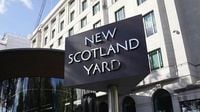On October 23, 2025, the streets of west and central London became the focal point of a high-stakes espionage investigation as British police arrested three men, aged 44, 45, and 48, on suspicion of spying for Russia. The Metropolitan Police, acting under the 2023 National Security Act, detained the trio at various addresses, plunging the city into the center of an ongoing battle between the United Kingdom and foreign intelligence services accused of targeting the country with increasingly bold operations.
According to the Metropolitan Police, the men were arrested "on suspicion of assisting a foreign intelligence service," with the country in question being Russia. As reported by Reuters and the Associated Press, these arrests were not isolated incidents but rather the latest in a series of actions taken by British authorities to counter what they describe as a surge in Russian-led espionage, sabotage, and cyber-interference campaigns against the UK. Searches were immediately launched at the suspects' homes and at another location in west London, with counterterrorism police leading the investigation.
Commander Dominic Murphy, head of counterterrorism policing in London, emphasized the gravity of the situation and the evolving nature of modern espionage. "We’re seeing an increasing number of who we would describe as ‘proxies’ being recruited by foreign intelligence services, and these arrests are directly related to our ongoing efforts to disrupt this type of activity," Murphy said, as quoted by Euro Weekly News. He warned that anyone tempted to participate in such activities should reconsider, stressing, "This kind of activity will be investigated and anyone found to be involved can expect to be prosecuted and there are potentially very serious consequences for those who are convicted."
The arrests come amid heightened fears of foreign interference in the UK, especially from Russia. British authorities allege that Russia is conducting an aggressive campaign of espionage, sabotage, and cyber-terrorism targeting the UK and its interests. As Global Banking and Finance Review noted, the police's ongoing searches and investigations are part of a broader strategy to disrupt espionage activities linked to Russia, reflecting the growing concern within British intelligence circles.
This latest episode is not occurring in a vacuum. In 2024, an arson attack on businesses in east London with ties to Ukraine—allegedly orchestrated by the Russian mercenary group Wagner—led to the sentencing of six men in July 2025. The ringleader, Dylan Earl, became the first individual convicted under the 2023 National Security Act, which expanded the powers of prosecutors to bring spying suspects to trial under a wider set of circumstances. Prosecutors argued that the attack was ordered by Wagner as part of a broader campaign of sabotage against targets perceived as hostile to Russian interests.
Just last month, two men and three women were arrested in Essex on suspicion of espionage for Russia, according to Euro Weekly News. Earlier in May, six Bulgarians were jailed for a combined fifty years for spying on behalf of the Kremlin, not only in the UK but also in other European countries. The pattern is clear: British authorities are facing a steady uptick in cases involving individuals allegedly acting as agents or "proxies" for foreign intelligence services, particularly those of Russia.
Ken McCallum, the head of the MI5 security service, has been outspoken about the threats posed by Russian intelligence operations. "In the last year, we and the police have disrupted a steady stream of surveillance plots with hostile intent aimed at individuals Russian leaders perceive as their enemies," McCallum stated, as reported by Euro Weekly News and the Associated Press. He described Russia as "committed to causing havoc and destruction," and revealed that MI5 has seen a 35 percent increase in the number of individuals it is investigating for state threats from Russia, China, and Iran over the past year.
In response to this escalating threat, British intelligence agencies are taking innovative steps. MI6 has reportedly launched a portal on the dark web, aiming to attract more foreign spies—particularly those willing to provide information about Russian operations. This move is part of a broader effort to turn the tables on hostile actors by leveraging technology and the anonymity of the dark web to recruit assets from within adversarial intelligence services.
The Kremlin, for its part, has consistently denied any involvement in espionage, sabotage, or conspiracies against the UK or other European countries supporting Ukraine. Russian officials have accused the British government of routinely blaming Russia for any negative events occurring within the UK, dismissing the espionage allegations as politically motivated. Despite these denials, British authorities remain adamant that the evidence points to a concerted campaign of covert action directed from Moscow.
The 2023 National Security Act, under which the latest arrests were made, represents a significant shift in the UK’s approach to countering foreign intelligence threats. The law broadens the legal framework for prosecuting espionage, sabotage, and related activities, giving law enforcement and prosecutors new tools to bring suspects to justice. Its implementation has already led to several high-profile convictions and is seen by many within the intelligence community as a necessary response to the evolving tactics of foreign adversaries.
The UK’s recent experiences are not unique in Europe. Across the continent, several countries have reported a spike in Russian espionage activity, particularly since the onset of the war in Ukraine. The targeting of individuals and organizations perceived as hostile to Russian interests has become a common theme, with authorities in multiple countries reporting increased efforts by Moscow to infiltrate, disrupt, and gather intelligence on Western governments and their allies.
For the British public, the revelations serve as a stark reminder of the hidden battles waged beneath the surface of daily life. While the arrests in London may seem like scenes from a Cold War thriller, they underscore a very real and present danger. The methods may have changed—cyber-attacks, proxies, and dark web recruitment replacing dead drops and microfilm—but the stakes remain as high as ever.
As the investigation into the three men continues, and as searches at their addresses and other locations unfold, British authorities are keen to send a message: the UK will not tolerate foreign interference, and those caught assisting hostile intelligence services will face the full force of the law. Whether these efforts will be enough to stem the tide of espionage remains to be seen, but for now, London stands as a frontline in the ongoing struggle to protect national security in an age of shadowy threats and shifting allegiances.





